The Graphene Based Material Market is estimated to be valued at USD 0.3 billion in 2025 and is projected to reach USD 6.1 billion by 2035, registering a compound annual growth rate (CAGR) of 33.1% over the forecast period. Year-over-year (YoY) analysis highlights the steep growth trajectory driven by the material’s unmatched mechanical strength, electrical conductivity, and versatility across industries. Between 2020 and 2025, the market advances slowly, rising from USD 0.1 billion to USD 0.3 billion, as commercialization remains limited to research-scale and early pilot projects. However, from 2026 onward, adoption accelerates as industries begin integrating graphene in energy storage, composites, coatings, and electronics.
By 2030, market value is expected to cross USD 1.5 billion, reflecting YoY growth rates in double digits, fueled by the scaling of graphene-enabled batteries, conductive inks, and advanced composites. This phase signals a strong transition from early adoption to commercial scaling, with applications in automotive and aerospace driving market penetration. Beyond 2030, growth becomes exponential as new supply chains and manufacturing efficiencies reduce costs, allowing graphene to replace or complement conventional materials in high-performance applications. By 2035, the market reaches USD 6.1 billion, with YoY growth sustained by widespread adoption in flexible electronics, renewable energy, and industrial applications, establishing graphene as a critical next-generation material.
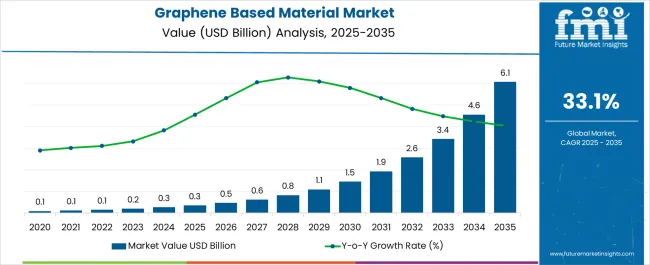
| Metric | Value |
|---|---|
| Graphene Based Material Market Estimated Value in (2025 E) | USD 0.3 billion |
| Graphene Based Material Market Forecast Value in (2035 F) | USD 6.1 billion |
| Forecast CAGR (2025 to 2035) | 33.1% |
The graphene based material market is expanding steadily due to rising demand for lightweight high performance materials in sectors such as electronics energy storage and advanced composites. The exceptional electrical thermal and mechanical properties of graphene are being leveraged in next generation electronic circuits supercapacitors batteries and coatings.
Ongoing research investments from both private and public institutions are accelerating commercialization pathways for graphene derivatives. Advancements in scalable production methods and integration with existing semiconductor manufacturing processes have further boosted market readiness.
With increasing emphasis on sustainable and energy efficient technologies across global industries the use of graphene based materials is expected to grow significantly. The outlook remains positive as applications continue to broaden across consumer electronics aerospace automotive and medical devices where miniaturization strength and conductivity are critical.
The graphene based material market is segmented by type, form, application, and geographic regions. By type, the graphene based material market is divided into Monolayer graphene, Multilayer graphene, Graphene oxide, Graphene nanoplates, and Others. In terms of form, the graphene-based material market is classified into Powder, Sheet and film, Foam, and Aerogel. Based on application, the graphene-based material market is segmented into Electronics, Energy, Healthcare, aerospace and defense, Composites, and Automotive. Regionally, the graphene based material industry is classified into North America, Latin America, Western Europe, Eastern Europe, Balkan & Baltic Countries, Russia & Belarus, Central Asia, East Asia, South Asia & Pacific, and the Middle East & Africa.
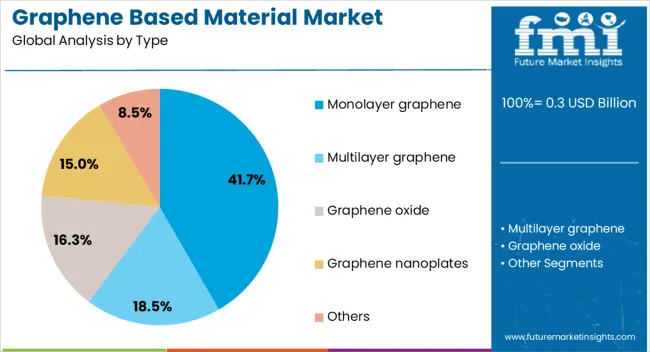
Monolayer graphene is projected to hold 41.70% of total revenue by 2025 within the type category, making it the dominant segment. This leadership position is driven by its superior conductivity, high surface area, and mechanical strength compared to multilayer alternatives.
Its single-atom thickness allows for enhanced electron mobility, which is critical in advanced electronic applications and energy storage systems. Monolayer graphene also demonstrates significant potential in transparent conductive films, photodetectors, and flexible electronics, where purity and performance consistency are essential.
As industries seek precision and efficiency in nanoscale applications, this type of graphene remains the preferred choice for both researchers and commercial product developers, reinforcing its top position in the market.
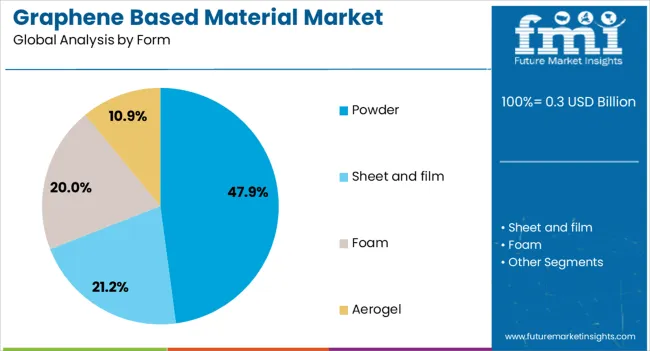
The powder form segment is expected to contribute 47.90% of overall market revenue by 2025, establishing itself as the leading form category. This dominance is attributed to the versatility, ease of storage, and cost-effective transport of powdered graphene materials.
Its widespread use across composite batteries, coatings, and inks has supported extensive adoption. Powder form allows for easier blending into polymer matrices, resins, and conductive pastes, which are commonly used in both industrial and research settings.
Additionally, the scalability of powder processing methods has enabled manufacturers to meet growing demand across diverse applications. These factors have collectively supported its leadership in the form segment of the graphene-based material market.
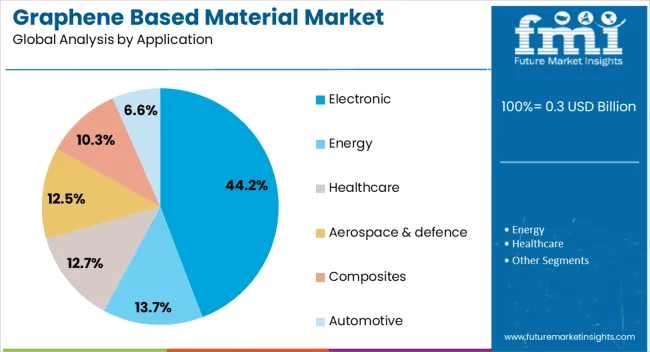
The electronic application segment is forecasted to account for 44.20% of market revenue by 2025, making it the foremost application area. This is primarily due to the increasing demand for flexible high-speed and low-power electronic devices.
Graphene’s exceptional electrical conductivity and electron mobility make it suitable for use in transistors, sensors, printed circuit boards, and wearable electronics. Continuous miniaturization in consumer and industrial electronics is driving demand for materials that support performance without adding weight or heat.
Additionally, the integration of graphene into next-generation semiconductor architectures and transparent electrodes is gaining momentum. These advancements have positioned electronics as the primary application for graphene-based materials, supported by innovation and industrial investment alike.
The graphene-based material market is expanding rapidly as industries recognize the unique mechanical, electrical, and thermal properties of graphene. With applications across electronics, energy storage, composites, coatings, and biomedical devices, demand is driven by technological advancement and the push for next-generation materials. Graphene’s conductivity, strength, and flexibility make it a key enabler for lightweight structures, high-capacity batteries, and advanced sensors. North America and Europe lead with strong R&D and commercialization efforts, while Asia-Pacific benefits from large-scale manufacturing initiatives. Market focus is on scalable production, cost reduction, and application-specific product development.
Despite graphene’s promise, large-scale, cost-efficient production remains a major hurdle. Methods such as chemical vapor deposition (CVD), mechanical exfoliation, and chemical reduction vary in quality, cost, and scalability. High production expenses limit widespread adoption in mass-market applications such as automotive or consumer electronics. Inconsistency in material quality such as layer thickness, purity, and defect density creates barriers for standardization. Until breakthroughs in low-cost, high-quality graphene production become mainstream, manufacturers may struggle to balance performance with affordability in commercial markets.
Technological progress is unlocking new applications for graphene-based materials. Advancements in graphene composites enhance strength-to-weight ratios in aerospace and automotive sectors, while graphene coatings offer superior corrosion and wear resistance. In energy storage, graphene improves battery charging speeds and cycle life, while enabling high-performance supercapacitors. Emerging biomedical applications include drug delivery systems, biosensors, and tissue engineering. Partnerships between material producers, startups, and research institutions accelerate product validation and commercialization. Companies focusing on tailored graphene solutions for niche, high-value applications are positioned to lead early market adoption.
The absence of standardized testing protocols and regulatory frameworks for graphene-based materials is a critical barrier. Variability in graphene grades complicates performance benchmarking and regulatory approval for sensitive applications such as medical devices and electronics. Governments and international agencies are beginning to establish guidelines for quality control, labeling, and environmental safety. Compliance with nanomaterial regulations, workplace safety, and product certifications is essential for market credibility. Until clear global standards and certifications are in place, regulatory uncertainty may hinder graphene adoption in large-scale industrial and healthcare applications.
The market is highly competitive, with startups, established material companies, and research-backed enterprises vying for leadership. Competition centers on proprietary production techniques, intellectual property, and partnerships with end-use industries. Supply chains rely on graphite feedstock, chemical reagents, and specialized equipment, with cost fluctuations and regional dependencies affecting stability. Companies investing in vertical integration, sustainable raw material sourcing, and strategic alliances with downstream manufacturers gain a strong advantage. Differentiation through patent portfolios, scalable manufacturing, and application-specific expertise will remain key in navigating competition and accelerating commercialization.
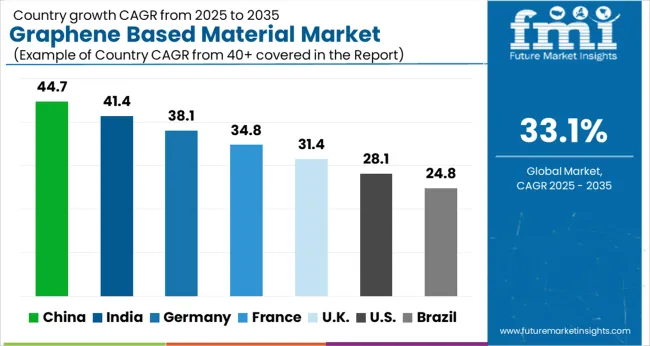
| Countries | CAGR |
|---|---|
| China | 44.7% |
| India | 41.4% |
| Germany | 38.1% |
| France | 34.8% |
| UK | 31.4% |
| USA | 28.1% |
| Brazil | 24.8% |
The global Graphene Based Material Market is projected to grow at a CAGR of 33.1% through 2035, supported by increasing demand across electronics, composites, and energy storage applications. Among BRICS nations, China has been recorded with 44.7% growth, driven by large-scale research, production, and deployment in advanced material applications, while India has been observed at 41.4%, supported by rising utilization in electronics, coatings, and industrial uses. In the OECD region, Germany has been measured at 38.1%, where production and adoption for composites, batteries, and industrial applications have been steadily maintained. The United Kingdom has been noted at 31.4%, reflecting consistent use in electronics and advanced materials, while the USA has been recorded at 28.1%, with production and utilization across composites, energy, and industrial sectors being steadily increased. This report includes insights on 40+ countries; the top five markets are shown here for reference.
The graphene based material market in China is expanding at a CAGR of 44.7%, making the country a global leader in this sector. China’s dominance is driven by its strong manufacturing ecosystem, extensive research and development, and government initiatives promoting advanced materials for next-generation industries. Graphene’s superior electrical conductivity, thermal resistance, and mechanical strength make it ideal for applications in electronics, energy storage, automotive, and aerospace. The rapid growth of electric vehicles (EVs), consumer electronics, and renewable energy solutions further fuels demand. Chinese companies are investing heavily in scalable graphene production techniques to reduce costs and improve performance. Additionally, collaborations between research institutions and industry players are fostering innovation and commercialization of graphene-based applications. With a strong focus on sustainable energy and advanced technology adoption, China is set to maintain its leadership in the graphene based material market over the coming years.
The graphene based material market in India is growing at a CAGR of 41.4%, driven by rapid industrialization, increasing focus on renewable energy, and expanding electronics manufacturing. Graphene’s exceptional properties, including conductivity, flexibility, and mechanical strength, make it a promising material for multiple applications such as energy storage, sensors, composites, and electronics. India’s growing electric vehicle (EV) sector and its push for solar energy storage are fueling demand for graphene-enhanced batteries and supercapacitors. Academic institutions and startups are playing a significant role in graphene research, with support from government initiatives aimed at fostering nanotechnology and advanced materials. Additionally, India’s cost-competitive manufacturing ecosystem makes it attractive for scaling graphene production. As demand for high-performance materials rises across industries like aerospace, automotive, and defense, India’s graphene based material market is poised for significant growth in the coming years.
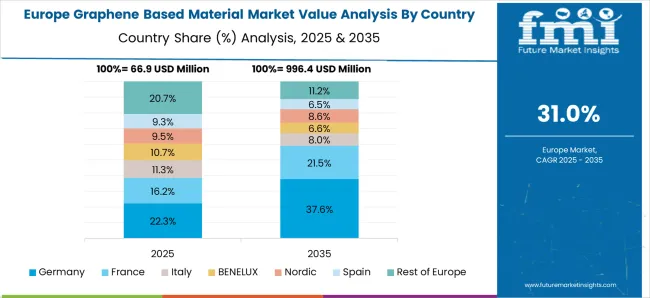
The graphene based material market in Germany is expanding at a CAGR of 38.1%, supported by the country’s advanced industrial base, strong R&D capabilities, and focus on sustainable technologies. Graphene is increasingly being adopted in high-performance applications, including automotive components, aerospace materials, electronics, and renewable energy storage. Germany’s leadership in engineering and advanced manufacturing positions it as a key player in graphene innovation and commercialization. The government’s support for green energy initiatives, particularly in energy-efficient solutions and next-generation batteries, is fueling adoption. German companies and research institutions are collaborating to improve graphene production methods, ensuring cost-effectiveness and scalability. With its emphasis on precision engineering and sustainable technology development, Germany is becoming a hub for high-quality graphene-based solutions across multiple sectors. This focus is expected to strengthen the country’s role in the global graphene materials market.
The graphene based material market in the United Kingdom is growing at a CAGR of 31.4%, driven by strong research capabilities, government funding, and industrial adoption across multiple sectors. The UK is home to some of the earliest discoveries and advancements in graphene technology, which continue to support its innovation ecosystem. Industries such as healthcare, aerospace, automotive, and energy storage are increasingly exploring graphene-based applications for enhanced performance and sustainability. Government and private sector collaborations are fueling investments in graphene research, commercialization, and pilot projects. Universities are also playing a critical role in translating graphene research into industrial solutions. With a focus on developing advanced materials for energy-efficient and sustainable applications, the UK is well-positioned to expand its role in the global graphene materials market despite production scale challenges.
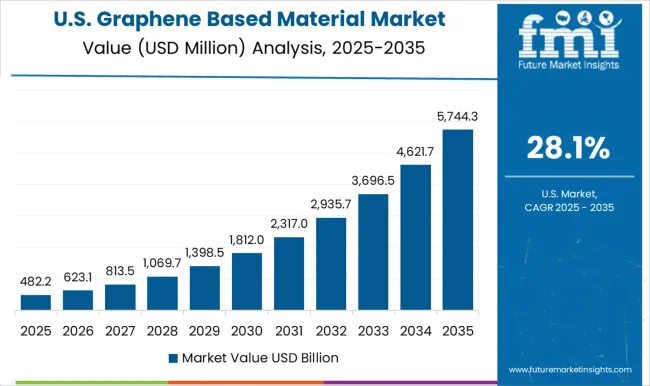
The graphene based material market in the United States is expanding at a CAGR of 28.1%, fueled by adoption in electronics, aerospace, defense, and renewable energy sectors. The USA has a robust research ecosystem supported by universities, national laboratories, and private companies driving graphene innovation. Applications in flexible electronics, high-capacity batteries, and advanced composites are gaining momentum. Government agencies, including the Department of Energy (DOE) and Department of Defense (DoD), are funding graphene research to enhance national competitiveness in advanced materials. USA companies are focusing on scalable graphene production and integration into commercial products, particularly in electric vehicles and energy storage. Rising demand for lightweight, strong, and conductive materials in aerospace and defense further supports market growth. With strong innovation and commercialization efforts, the USA is poised to remain an important player in the global graphene market.
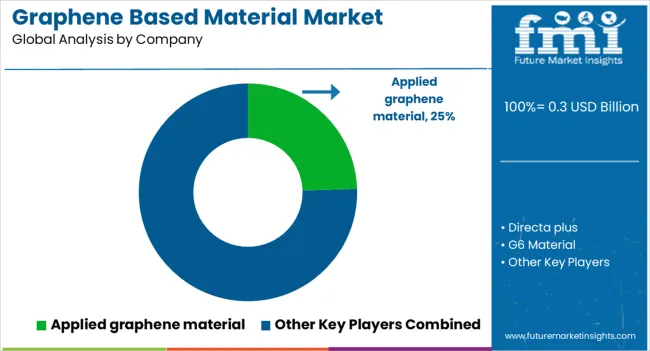
The graphene-based material market is expanding rapidly as industries recognize the potential of graphene’s exceptional properties, lightweight strength, high conductivity, flexibility, and thermal stability. These materials are being integrated into applications across energy storage, electronics, composites, coatings, healthcare, and advanced materials manufacturing. Innovations in batteries, supercapacitors, sensors, and sustainable lightweight materials drive demand.
Applied Graphene Materials is a notable supplier specializing in dispersions that enhance coatings, composites, and polymers. Directa Plus focuses on environmentally sustainable graphene-based solutions for textiles, environmental remediation, and composites. G6 Materials develops graphene-based products for the electronics and nanotechnology sectors, while the Global Graphene Group focuses on graphene-enhanced lithium-ion batteries and advanced energy storage systems. Grafoid Inc. is well-known for its investments in large-scale graphene production and advanced materials development. Graphene Square, based in South Korea, specializes in transparent conductive films and other electronics applications. Haydale Graphene Industries applies functionalized graphene into composites, elastomers, and inks for industrial adoption.
Merck, a global leader in materials science, has expanded its nanomaterials portfolio to include graphene-based products. Nanografi provides a wide range of nanomaterials, including graphene oxide, nanoplatelets, and customized formulations. NeoGraf specializes in graphite and graphene-based thermal management solutions, with a primary focus on electronics. Talga Group, headquartered in Australia, integrates mining with graphene and graphite production for energy storage and coatings. XFNANO Materials Tech Co., Ltd, based in China, offers graphene nanopowders, films, and derivatives for research and industrial-scale applications.
| Item | Value |
|---|---|
| Quantitative Units | USD 0.3 Billion |
| Type | Monolayer graphene, Multilayer graphene, Graphene oxide, Graphene nanoplates, and Others |
| Form | Powder, Sheet and film, Foam, and Aerogel |
| Application | Electronic, Energy, Healthcare, Aerospace & defence, Composites, and Automotive |
| Regions Covered | North America, Europe, Asia-Pacific, Latin America, Middle East & Africa |
| Country Covered | United States, Canada, Germany, France, United Kingdom, China, Japan, India, Brazil, South Africa |
| Key Companies Profiled | Applied graphene material, Directa plus, G6 Material, Global graphene group, Grafoid Inc, Graphene square, Haydale Graphene Industries, Merck, Nanografi, Neograf, Talga Group, and XFNANO Materials Tech Co., Ltd |
| Additional Attributes | Dollar sales vary by product type, including graphene oxide, nanoplatelets, and multilayer graphene; by form, like powder, sheets/films, foams, aerogels; by application, spanning electronics, composites, energy storage, automotive, healthcare, aerospace, and coatings; by region, led by Asia-Pacific, North America, and Europe. Growth is driven by high-performance composites, energy-dense storage, flexible electronics, and scalable manufacturing improvements. |
The global graphene based material market is estimated to be valued at USD 0.3 billion in 2025.
The market size for the graphene based material market is projected to reach USD 6.1 billion by 2035.
The graphene based material market is expected to grow at a 33.1% CAGR between 2025 and 2035.
The key product types in graphene based material market are monolayer graphene, multilayer graphene, graphene oxide, graphene nanoplates and others.
In terms of form, powder segment to command 47.9% share in the graphene based material market in 2025.






Full Research Suite comprises of:
Market outlook & trends analysis
Interviews & case studies
Strategic recommendations
Vendor profiles & capabilities analysis
5-year forecasts
8 regions and 60+ country-level data splits
Market segment data splits
12 months of continuous data updates
DELIVERED AS:
PDF EXCEL ONLINE
Graphene Infused Packaging Market Size and Share Forecast Outlook 2025 to 2035
Graphene Coated Fishing Gear Market Size and Share Forecast Outlook 2025 to 2035
Graphene Electronics Market Size and Share Forecast Outlook 2025 to 2035
Graphene Nanocomposites Market 2025 to 2035
Analyzing Graphene Films Market Share & Industry Insights
Si-based Hall Effect Sensors Market Size and Share Forecast Outlook 2025 to 2035
AI-based 3D reconstruction Tools Market Size and Share Forecast Outlook 2025 to 2035
AI based Triage Tools Market Size and Share Forecast Outlook 2025 to 2035
Ph Based Lip Balm Market Size and Share Forecast Outlook 2025 to 2035
AI-Based Driving Systems (L2 to L5) Market Analysis - Size, Share, and Forecast Outlook 2025 to 2035
Biobased And Synthetic Polyamides Market Size and Share Forecast Outlook 2025 to 2035
AI-based Research Services Market Analysis Size and Share Forecast Outlook 2025 to 2035
AI-based Atrial Fibrillation AFib Detection Market Size and Share Forecast Outlook 2025 to 2035
Biobased Polypropylene PP Size Market Size and Share Forecast Outlook 2025 to 2035
AI-based Surgical Robots Market Size and Share Forecast Outlook 2025 to 2035
Biobased Degreaser Market Size and Share Forecast Outlook 2025 to 2035
pH Based Lipstick Market Size and Share Forecast Outlook 2025 to 2035
Biobased Biodegradable Plastic Market Growth - Trends & Forecast 2025 to 2035
Biobased Propylene Glycol Market Growth - Trends & Forecast 2025 to 2035
AI-based Clinical Trials Solution Provider Market Trends – Growth & Forecast 2024-2034

Thank you!
You will receive an email from our Business Development Manager. Please be sure to check your SPAM/JUNK folder too.
Chat With
MaRIA